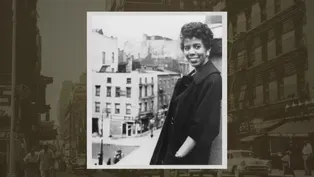
How public housing residents are being surveilled, punished
Clip: 6/4/2023 | 6m 57sVideo has Closed Captions
How surveillance cameras are being used to punish public housing residents
An investigation by The Washington Post found that surveillance cameras meant to fight violent crime in cities across the country are being used to punish and evict residents of public housing projects, at times for minor infractions or based on incorrect assumptions. Douglas MacMillan, the reporter who led the investigation, joins Lisa Desjardins to discuss the findings.
Problems with Closed Captions? Closed Captioning Feedback
Problems with Closed Captions? Closed Captioning Feedback
Major corporate funding for the PBS News Hour is provided by BDO, BNSF, Consumer Cellular, American Cruise Lines, and Raymond James. Funding for the PBS NewsHour Weekend is provided by...

How public housing residents are being surveilled, punished
Clip: 6/4/2023 | 6m 57sVideo has Closed Captions
An investigation by The Washington Post found that surveillance cameras meant to fight violent crime in cities across the country are being used to punish and evict residents of public housing projects, at times for minor infractions or based on incorrect assumptions. Douglas MacMillan, the reporter who led the investigation, joins Lisa Desjardins to discuss the findings.
Problems with Closed Captions? Closed Captioning Feedback
How to Watch PBS News Hour
PBS News Hour is available to stream on pbs.org and the free PBS App, available on iPhone, Apple TV, Android TV, Android smartphones, Amazon Fire TV, Amazon Fire Tablet, Roku, Samsung Smart TV, and Vizio.
Providing Support for PBS.org
Learn Moreabout PBS online sponsorshipLISA DESJARDINS: American cities are facing two aggravating crises, affordable public housing is in short supply and violent crime is on the rise.
A growing dynamic overlaps both legions of cameras are being deployed in public housing areas.
Officials argue they are a 24/7 crime deterrent.
But what happens when the camera focus shifts from fighting crime to monitoring the people they were put in place to protect.
An investigation by the Washington Post found those eyes on the poor are being used to punish and evict residents, at times for miniscule missteps at others based on wrong assumptions.
Doug MacMillan is the reporter who led this investigation for The Washington Post.
And he joins us now, Doug, let's start right off the top here.
These cameras are often purchased using government grants meant for fighting crime.
But take us through what you found out about punishment for those who live in those areas.
DOUG MACMILLAN, The Washington Post: Yes, so crime and drugs are still a very, ever present problem in many of the public housing communities around the country.
Not all of them, but many of them.
And one of the ways that they are increasingly trying to fight this problem is with cameras.
And you know, they're arguing that they can cover more ground is often very budget conscious resource strapped, local government agencies are trying to cover more ground and watch more of their territory with these cameras.
What my reporting has showed is when they put these cameras up, a lot of times they will begin turning them on residence and using them to catch violations of their lease agreements that you and me and many of our viewers here would probably not classify as crimes.
LISA DESJARDINS: What are some specifics?
DOUG MACMILLAN: So monitoring people for smoking in the wrong place.
Catching one woman was in her eviction proceedings in court contained a picture of her removing a laundry basket from the communal laundry room, you know ... LISA DESJARDINS: And she was evicted for that?
DOUG MACMILLAN: She wasn't evicted for that.
But that was part of the record that was brought before in court.
And the lawyers that I'm talking to who helped people who are dealing with these evictions say that more and more often, evictions that they are seeing from public housing authorities are referencing this footage.
And the footage is helping to persuade the courts and the judges in order to remove these people from their homes.
LISA DESJARDINS: What do the residents tell you about this?
Are they aware of these cameras?
And what do they see as the trade-offs here and their lives?
DOUG MACMILLAN: Yes, many residents actually want more cameras, many residents in public housing do fear for their lives and fear for the kind of crime and drug problems that are around them.
But a lot of times when the cameras go up, many of them kind of have a different experience.
And a different story about the cameras are, a lot of times they do not say that the cameras are being used to capture the problems that are the most severe for them.
For example, the daily occurrences of packages being stolen from their doorstep or a car being hit in front of their, their door.
A lot of times when these kinds of things happen what they tell me is that they will go to the housing authority asked for the footage to help them kind of solve those problems.
And in many times they say they're being told that the footage is not available or that they can't be used for that purpose.
So the question that you have to ask is, are these cameras being used to help the community that they're being put in to help or are they being used to watch that community.
LISA DESJARDINS: How widespread is this and how widespread is the use also, facial recognition here?
DOUG MACMILLAN: Yes, they're the cameras themselves are increasingly widespread.
I mean, most public housing authorities have some kind of surveillance system.
But what's happened in the past few years is they've gotten increasingly sophisticated.
And with these federal grants at the Department of Housing and Urban Development makes about $10 million annually available to public housing agencies.
And increasingly, that money is going further.
So in the past two or three years now that money that you leaves to get you a basic camera setup can now get you things like facial recognition, or cameras that have software baked into them that can recognize what's going on the screen, in some cases, make determinations about what's going on in the screen and determinations about what it thinks is suspicious.
LISA DESJARDINS: Wow, so that's really sort of a big brother factor what everyone's doing and when in that community?
DOUG MACMILLAN: Well, it's this question about automating policing and automating, you know, letting the camera and an algorithm decide what is suspicious.
And researchers have shown that facial recognition, for example, has been biased towards people of color and women, many cases have been misidentified by facial recognition cameras.
So am I reporting a show that and some not many yet, I think it's still very early, but in some public housing, authorities are beginning to use facial recognition to do things like enforce banned lists to identify people who have been banned from the property and alert authorities when they see -- when the cameras see them enter this properties.
LISA DESJARDINS: What are some of the ultimate consequences you found here?
Can folks who face eviction from this appeal these decisions?
And is there any dialogue either from your reporting with officials or for residents who say we don't like this?
How does that work?
DOUG MACMILLAN: Well, in many cases, I've found the residents are not aware of the cameras or any kind of policies around them.
And most of the cases I found the housing authorities haven't really kind of laid out policies around how they are going to use these cameras.
So I think what you could see for going forward is more of a dialogue about, you know, what should we allow these cameras abused for with should they not be allowed to use for.
But yes, the consequences can be very severe when people lose their home in public housing.
Oftentimes, they end up homeless because public housing, they're often at the end of the rope, and they don't have any other options.
That's why they are living in government subsidized housing.
And when they are evicted from their home, they often not only are homeless, but their future opportunities for employment and housing are severely diminished.
LISA DESJARDINS: You featured a woman who is on her sister's couch I think right now.
DOUG MACMILLAN: Yes, a woman who was kicked out of her housing for smoking outside of the property, among other reasons.
And she's living her sister's couch.
And she told me that when she's applying for housing now, when she goes to kind of apply for the next stop, she keeps getting into this barrier of they're running a reference check.
And they're rejecting her based on her eviction from public housing.
And so, you know, one instance like that of the cameras catching you doing something wrong could end up having lifetime consequences for you.
LISA DESJARDINS: I could hear some people saying, these folks are breaking rules, they're in public housing.
Is there any context on whether other kinds of landlords outside of public housing could evict people for these sorts of things?
DOUG MACMILLAN: Definitely, my reporting didn't really focus on this, but the cameras and surveillance equipment is growing focus for private developers all around the country.
And I think they're actually, you know, more opportunities for them to use sophisticated surveillance methods because they're not beholden to any federal agency or any local government agency, and the kinds of policies and scrutiny that might result from that.
LISA DESJARDINS: Doug MacMillan, a fascinating, important area that we might not have known about except for your reporting.
Thank you for the Washington Post joining us.
DOUG MACMILLAN: Thanks, Lisa.
How Lorraine Hansberry inspired countless LGBTQ+ writers
Video has Closed Captions
Clip: 6/4/2023 | 2m 49s | How Lorraine Hansberry inspired countless Black and LGBTQ+ writers (2m 49s)
The real-world influence of Nintendo’s ‘Legend of Zelda’
Video has Closed Captions
Clip: 6/4/2023 | 7m 14s | The real-world influence of Nintendo’s newest hit ‘Legend of Zelda’ game (7m 14s)
Providing Support for PBS.org
Learn Moreabout PBS online sponsorshipSupport for PBS provided by:
Major corporate funding for the PBS News Hour is provided by BDO, BNSF, Consumer Cellular, American Cruise Lines, and Raymond James. Funding for the PBS NewsHour Weekend is provided by...













